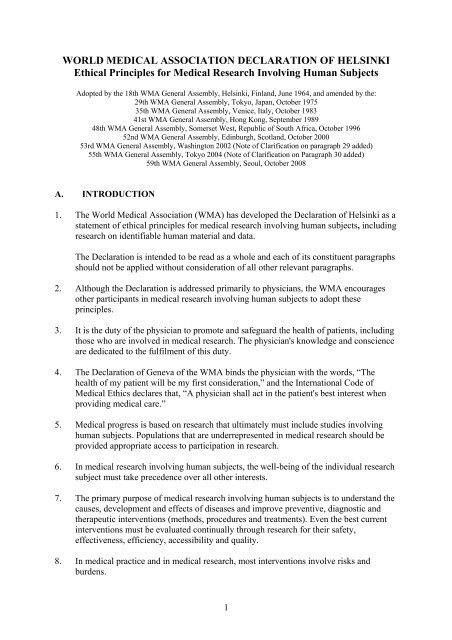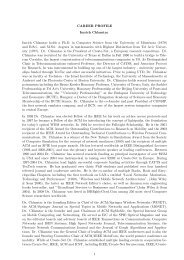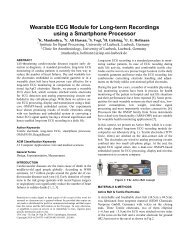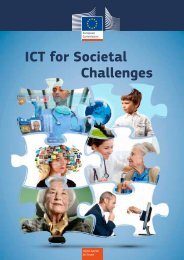WORLD MEDICAL ASSOCIATION DECLARATION OF HELSINKI ...
WORLD MEDICAL ASSOCIATION DECLARATION OF HELSINKI ...
WORLD MEDICAL ASSOCIATION DECLARATION OF HELSINKI ...
Create successful ePaper yourself
Turn your PDF publications into a flip-book with our unique Google optimized e-Paper software.
<strong>WORLD</strong> <strong>MEDICAL</strong> <strong>ASSOCIATION</strong> <strong>DECLARATION</strong> <strong>OF</strong> <strong>HELSINKI</strong>Ethical Principles for Medical Research Involving Human SubjectsAdopted by the 18th WMA General Assembly, Helsinki, Finland, June 1964, and amended by the:29th WMA General Assembly, Tokyo, Japan, October 197535th WMA General Assembly, Venice, Italy, October 198341st WMA General Assembly, Hong Kong, September 198948th WMA General Assembly, Somerset West, Republic of South Africa, October 199652nd WMA General Assembly, Edinburgh, Scotland, October 200053rd WMA General Assembly, Washington 2002 (Note of Clarification on paragraph 29 added)55th WMA General Assembly, Tokyo 2004 (Note of Clarification on Paragraph 30 added)59th WMA General Assembly, Seoul, October 2008A. INTRODUCTION1. The World Medical Association (WMA) has developed the Declaration of Helsinki as astatement of ethical principles for medical research involving human subjects, includingresearch on identifiable human material and data.The Declaration is intended to be read as a whole and each of its constituent paragraphsshould not be applied without consideration of all other relevant paragraphs.2. Although the Declaration is addressed primarily to physicians, the WMA encouragesother participants in medical research involving human subjects to adopt theseprinciples.3. It is the duty of the physician to promote and safeguard the health of patients, includingthose who are involved in medical research. The physician's knowledge and conscienceare dedicated to the fulfilment of this duty.4. The Declaration of Geneva of the WMA binds the physician with the words, “Thehealth of my patient will be my first consideration,” and the International Code ofMedical Ethics declares that, “A physician shall act in the patient's best interest whenproviding medical care.”5. Medical progress is based on research that ultimately must include studies involvinghuman subjects. Populations that are underrepresented in medical research should beprovided appropriate access to participation in research.6. In medical research involving human subjects, the well-being of the individual researchsubject must take precedence over all other interests.7. The primary purpose of medical research involving human subjects is to understand thecauses, development and effects of diseases and improve preventive, diagnostic andtherapeutic interventions (methods, procedures and treatments). Even the best currentinterventions must be evaluated continually through research for their safety,effectiveness, efficiency, accessibility and quality.8. In medical practice and in medical research, most interventions involve risks andburdens.1
DoH/Oct20089. Medical research is subject to ethical standards that promote respect for all humansubjects and protect their health and rights. Some research populations are particularlyvulnerable and need special protection. These include those who cannot give or refuseconsent for themselves and those who may be vulnerable to coercion or undueinfluence.10. Physicians should consider the ethical, legal and regulatory norms and standards forresearch involving human subjects in their own countries as well as applicableinternational norms and standards. No national or international ethical, legal orregulatory requirement should reduce or eliminate any of the protections for researchsubjects set forth in this Declaration.B. PRINCIPLES FOR ALL <strong>MEDICAL</strong> RESEARCH11. It is the duty of physicians who participate in medical research to protect the life, health,dignity, integrity, right to self-determination, privacy, and confidentiality of personalinformation of research subjects.12. Medical research involving human subjects must conform to generally acceptedscientific principles, be based on a thorough knowledge of the scientific literature, otherrelevant sources of information, and adequate laboratory and, as appropriate, animalexperimentation. The welfare of animals used for research must be respected.13. Appropriate caution must be exercised in the conduct of medical research that mayharm the environment.14. The design and performance of each research study involving human subjects must beclearly described in a research protocol. The protocol should contain a statement of theethical considerations involved and should indicate how the principles in thisDeclaration have been addressed. The protocol should include information regardingfunding, sponsors, institutional affiliations, other potential conflicts of interest,incentives for subjects and provisions for treating and/or compensating subjects who areharmed as a consequence of participation in the research study. The protocol shoulddescribe arrangements for post-study access by study subjects to interventions identifiedas beneficial in the study or access to other appropriate care or benefits.15. The research protocol must be submitted for consideration, comment, guidance andapproval to a research ethics committee before the study begins. This committee mustbe independent of the researcher, the sponsor and any other undue influence. It musttake into consideration the laws and regulations of the country or countries in which theresearch is to be performed as well as applicable international norms and standards butthese must not be allowed to reduce or eliminate any of the protections for researchsubjects set forth in this Declaration. The committee must have the right to monitorongoing studies. The researcher must provide monitoring information to the committee,especially information about any serious adverse events. No change to the protocol maybe made without consideration and approval by the committee.16. Medical research involving human subjects must be conducted only by individuals withthe appropriate scientific training and qualifications. Research on patients or healthy2
DoH/Oct2008volunteers requires the supervision of a competent and appropriately qualified physicianor other health care professional. The responsibility for the protection of researchsubjects must always rest with the physician or other health care professional and neverthe research subjects, even though they have given consent.17. Medical research involving a disadvantaged or vulnerable population or community isonly justified if the research is responsive to the health needs and priorities of thispopulation or community and if there is a reasonable likelihood that this population orcommunity stands to benefit from the results of the research.18. Every medical research study involving human subjects must be preceded by carefulassessment of predictable risks and burdens to the individuals and communitiesinvolved in the research in comparison with foreseeable benefits to them and to otherindividuals or communities affected by the condition under investigation.19. Every clinical trial must be registered in a publicly accessible database beforerecruitment of the first subject.20. Physicians may not participate in a research study involving human subjects unless theyare confident that the risks involved have been adequately assessed and can besatisfactorily managed. Physicians must immediately stop a study when the risks arefound to outweigh the potential benefits or when there is conclusive proof of positiveand beneficial results.21. Medical research involving human subjects may only be conducted if the importance ofthe objective outweighs the inherent risks and burdens to the research subjects.22. Participation by competent individuals as subjects in medical research must bevoluntary. Although it may be appropriate to consult family members or communityleaders, no competent individual may be enrolled in a research study unless he or shefreely agrees.23. Every precaution must be taken to protect the privacy of research subjects and theconfidentiality of their personal information and to minimize the impact of the study ontheir physical, mental and social integrity.24. In medical research involving competent human subjects, each potential subject must beadequately informed of the aims, methods, sources of funding, any possible conflicts ofinterest, institutional affiliations of the researcher, the anticipated benefits and potentialrisks of the study and the discomfort it may entail, and any other relevant aspects of thestudy. The potential subject must be informed of the right to refuse to participate in thestudy or to withdraw consent to participate at any time without reprisal. Specialattention should be given to the specific information needs of individual potentialsubjects as well as to the methods used to deliver the information. After ensuring thatthe potential subject has understood the information, the physician or anotherappropriately qualified individual must then seek the potential subject’s freely-giveninformed consent, preferably in writing. If the consent cannot be expressed in writing,the non-written consent must be formally documented and witnessed.3
DoH/Oct200825. For medical research using identifiable human material or data, physicians mustnormally seek consent for the collection, analysis, storage and/or reuse. There may besituations where consent would be impossible or impractical to obtain for such researchor would pose a threat to the validity of the research. In such situations the research maybe done only after consideration and approval of a research ethics committee.26. When seeking informed consent for participation in a research study the physicianshould be particularly cautious if the potential subject is in a dependent relationshipwith the physician or may consent under duress. In such situations the informed consentshould be sought by an appropriately qualified individual who is completelyindependent of this relationship.27. For a potential research subject who is incompetent, the physician must seek informedconsent from the legally authorized representative. These individuals must not beincluded in a research study that has no likelihood of benefit for them unless it isintended to promote the health of the population represented by the potential subject,the research cannot instead be performed with competent persons, and the researchentails only minimal risk and minimal burden.28. When a potential research subject who is deemed incompetent is able to give assent todecisions about participation in research, the physician must seek that assent in additionto the consent of the legally authorized representative. The potential subject’s dissentshould be respected.29. Research involving subjects who are physically or mentally incapable of givingconsent, for example, unconscious patients, may be done only if the physical or mentalcondition that prevents giving informed consent is a necessary characteristic of theresearch population. In such circumstances the physician should seek informed consentfrom the legally authorized representative. If no such representative is available and ifthe research cannot be delayed, the study may proceed without informed consentprovided that the specific reasons for involving subjects with a condition that rendersthem unable to give informed consent have been stated in the research protocol and thestudy has been approved by a research ethics committee. Consent to remain in theresearch should be obtained as soon as possible from the subject or a legally authorizedrepresentative.30. Authors, editors and publishers all have ethical obligations with regard to thepublication of the results of research. Authors have a duty to make publicly availablethe results of their research on human subjects and are accountable for the completenessand accuracy of their reports. They should adhere to accepted guidelines for ethicalreporting. Negative and inconclusive as well as positive results should be published orotherwise made publicly available. Sources of funding, institutional affiliations andconflicts of interest should be declared in the publication. Reports of research not inaccordance with the principles of this Declaration should not be accepted forpublication.4
DoH/Oct2008C. ADDITIONAL PRINCIPLES FOR <strong>MEDICAL</strong> RESEARCH COMBINED WITH<strong>MEDICAL</strong> CARE31. The physician may combine medical research with medical care only to the extent thatthe research is justified by its potential preventive, diagnostic or therapeutic value and ifthe physician has good reason to believe that participation in the research study will notadversely affect the health of the patients who serve as research subjects.32. The benefits, risks, burdens and effectiveness of a new intervention must be testedagainst those of the best current proven intervention, except in the followingcircumstances:• The use of placebo, or no treatment, is acceptable in studies where no currentproven intervention exists; or• Where for compelling and scientifically sound methodological reasons the use ofplacebo is necessary to determine the efficacy or safety of an intervention and thepatients who receive placebo or no treatment will not be subject to any risk ofserious or irreversible harm. Extreme care must be taken to avoid abuse of thisoption.33. At the conclusion of the study, patients entered into the study are entitled to beinformed about the outcome of the study and to share any benefits that result from it, forexample, access to interventions identified as beneficial in the study or to otherappropriate care or benefits.34. The physician must fully inform the patient which aspects of the care are related to theresearch. The refusal of a patient to participate in a study or the patient’s decision towithdraw from the study must never interfere with the patient-physician relationship.35. In the treatment of a patient, where proven interventions do not exist or have beenineffective, the physician, after seeking expert advice, with informed consent from thepatient or a legally authorized representative, may use an unproven intervention if in thephysician's judgement it offers hope of saving life, re-establishing health or alleviatingsuffering. Where possible, this intervention should be made the object of research,designed to evaluate its safety and efficacy. In all cases, new information should berecorded and, where appropriate, made publicly available.5






